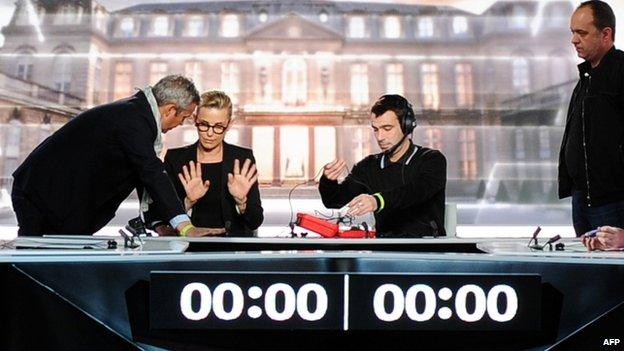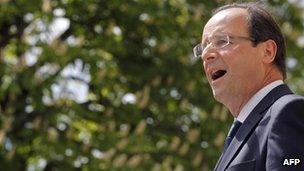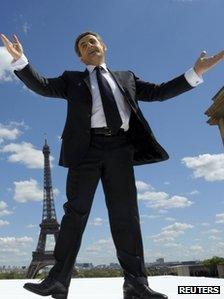French election: The TV debate
- Published
- comments

Negotiations for the debate have been long and detailed
Both campaigns regard tonight's TV debate as potentially crucial. Twenty million people may watch the two-and-a-half hour debate. Five days before polling it is the only time President Nicolas Sarkozy and Francois Hollande will debate head-to-head.
Both camps have been leaving nothing to chance. The negotiations over the format have been long and detailed.
President Sarkozy has described it as "not a contest of words but a moment of truth".
It may be the last chance to give his campaign momentum. If the polls are right he needs to swing 1.5 million people to his side. He will go into the debate the underdog.
For Francois Hollande the challenge is to avoid any slip-up that will feed doubts over his economic plans or his inexperience in government. He has said: "I have no coach, just myself. It's not a boxing match or a wrestling match."

Mr Hollande says he has no coach, just himself, in Wednesday's debate
In the TV gallery controlling 20 cameras, both candidates will have their own director to guarantee fair coverage. President Sarkozy does not want any profile shots and Francois Hollande has sought reassurances there will be no reflections in his glasses.
When one candidate is speaking, the TV director cannot cut away to the other candidate for reaction shots. The temperature in the studio has been agreed. It will be between 19 and 20C. Neither candidate wants a sweaty top lip or brow. Each will have access to controls to cool the temperature around them.
A potential weakness in the format is that presenters will not be able to push candidates if they do not answer the question or they go off-track.
The president is a formidable debater. The danger is that he comes across as too aggressive or too angry. He cannot, however, afford to hold back.
'Dangerous' Hollande
The Sarkozy team believes that Francois Hollande's weakness is his spending plans and will try to use the debate to portray him as a left-winger with dangerous tax and spend policies.
For instance, how can he offer to recruit 60,000 more teachers whilst meeting EU targets for cutting the budget? To bring the deficit down to 3% next year, the IMF estimates the country will need 18bn euros of cuts.
At such a time how will he afford his spending plans? The president is likely to warn - as he has already - that his Socialist rival risks taking France on a road that will lead to Greece and its failed economy.
Mr Hollande has received wide attention for promising to make growth and not austerity his priority. He has promised to renegotiate the pact enforcing greater budgetary discipline in the eurozone.
German Chancellor Angela Merkel has said there won't be any renegotiation of the pact itself.

On May Day, Mr Sarkozy staged a Hollywood-style rally at the Trocadero
The president might try to suggest that an Hollande victory will damage Franco-German relations but this is delicate ground for many French voters who like the idea of their president standing up to Berlin. And Mr Hollande has some useful cover in that the president of the European Central Bank, external has said there needs to be a growth pact.
When criticised during the campaign, Mr Hollande has fallen back on attacking Mr Sarkozy's record. He has said that it isn't him that lost the country its triple-A rating or who allowed the numbers of unemployed to reach four million. He describes Mr Sarkozy as a "failed president".
Unless there is a major gaffe, these debates are crucially about style. I remember during the last election campaign in America that Barack Obama practised how to sit on a stool in order to appear relaxed and yet authoritative at the same time.
Part of Mr Hollande's success so far is that he has sold himself as Mr Normal. He has played up how ordinary he is in contrast with the man he refers to as Mr Zig Zag.
Yesterday, the president staged a Hollywood-style rally at the Trocadero with the Eiffel Tower as a backdrop. Cameras swooped across the crowd like at a pop concert. It was highly professional and flashy.
'Spin Alley'
Mr Hollande does not mind that. He is out to reassure the French that he is an ordinary man who understands them and will protect their way of life with its high social spending.
Mr Hollande may not have been coached but he has taken advice from his former partner, Segolene Royal, who went up against Nicolas Sarkozy at the last election. She has two pieces of advice. Match Sarkozy "blow for blow" and manage the spin afterwards - the "media interpretation".
In the United States, as soon as the debate is over, advisers and supporters head for what they call "Spin Alley" where they try to define the story of the night with their candidate as winner.
These debates, however, rarely rescue a failing campaign but they have the potential to surprise, to deliver a defining moment. It is Nicolas Sarkozy's last opportunity to save his presidency.